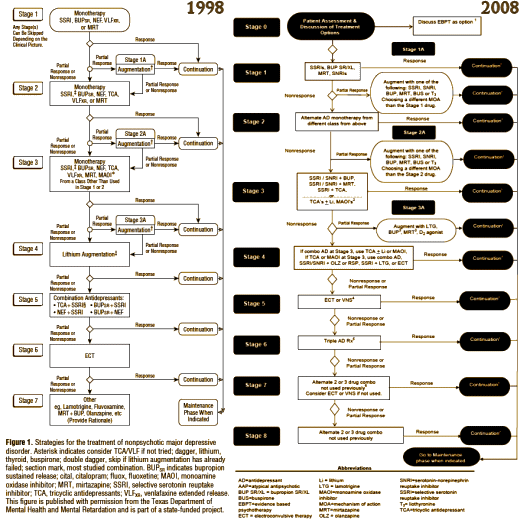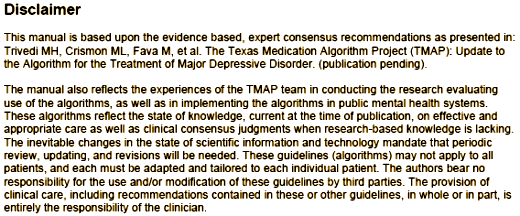
It was a picture perfect Georgia Mountain week-end, great for a community Bar-B-Q in the mega-cooker – dinner on the grounds for 100 or so. Hardly a thought of matters medical or psychiatric that day. But the grey days that followed were equally fine days for some review time with the history of the algorithms used for antidepressants [the null hypothesis…, paper churning. why?…, along the way…]. I think it’s the TMAP/J&J trial coming in November that has these things in my mind. I know that the center of that trial has to do with the Atypical Antipsychotics, but Drs. Rush and Trivedi are antidepressant guys, and TMAP certainly had algorithms for the Antidepressants. I found another TMAP algorithm, this time for 2008 [the earlier one was 1998]. And I tried to compare them, but came up with little to say. They still seem arbitrary to me:

I know you can’t read them from the above – the point is their complexity. Here are the links for comparison of them all in detail: TMAP1998, STAR*D2001, IMPACTS2003, and TMAP2008.
 from the 2008 TMAP Manual
from the 2008 TMAP ManualI knew nothing of these
algorithms during the span of years when they were apparently in vogue. Reading them now, they seem like the productions of an obsessional person who was trying to avoid feeling the disappointment that the drugs have only a finite usefulness. They all came from the same place – the University of Texas Mood Disorders group lead by Madhukar Trivedi under the direction of John Rush. The NIMH STAR*D study was their implementation of one version of this notion that a sequential
algorithm would improve the results – but the patients weren’t so
patient after all, and dropped out of the study in droves [
a thirty-five million dollar misunderstanding…]. IMPACTS was another NIMH implementation, but it didn’t even complete recruitment. By the 2008 version of TMAP, they were equating ECT with
Vagal Nerve Stimulation? and following that with
Triple Antidepressants? Where did all this stuff come from?
Okay, I’ll come clean. That cooker up there has a reason to be there and I lied about "Hardly a thought of matters medical or psychiatric that day." I did think about algorithms last weekend. Friend Al and I have been cooking pork for large groups for most of our adult lives – separately and together. In the South, that can be a profession, but we’ve just done it for fun. We both have strong opinions about the right way to do it, sometimes at odds, but usually in accord enough to get the job done. Some of those ideas are absolutely meaningless rituals, others are essential. The bottom line is to cook it for a long time – like @ least 10 hours. Everything else has to do with how to do that – low steady indirect heat [200º-250º], using various techniques to keep the meat moist – like searing the outside early or wrapping it in foil at some point, etc. I learned by cooking whole pigs over an open pit from a friend from Spartanburg. Al learned with butts and shoulders smoked in an old refrigerator he adapted [a refrigismoker]. But the basic algorithm remains the same – slow indirect heat for a long time retaining moisture [hickory sparingly mixed with fruitwood is good]. The fun part is that it always works, just like it did Saturday. That’s what an algorithm is – a way to insure a repeat performance of a previous success. There’s an algorithm for sauces too. Mine is store brand prepared mustard with dark brown sugar added until it turns that certain color. One can add a thousand other things for flavor, and we do sometimes, but the other things don’t really matter. It’s that certain color that says it’s neither still mustard nor is it yet syrup – it’s Bar-B-Q sauce, South Carolina style…
Those antidepressant ‘recipes’? None of them are based on proven successes. None of them seem constructed on a coherent plan. One is stretching the definition to even use the term algorithm – "a logical arithmetical or computational procedure that if correctly applied ensures the solution of a problem." There are lots of questions that might be asked about the Decade of Algorithms, but the foremost on the list is "why did anyone go along with these arbitrary constructs as having clinical meaning?" It beats me…



Harvard announced today that it’s Safra Center for Ethics (with Lessig leadership) is sponsoring a short term contest on improving institutional ethics. Seems to me that the author of this blog might have a substantive entry…
http://news.harvard.edu/gazette/story/2011/10/wanted-ways-to-battle-corruption/